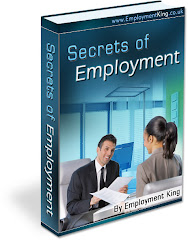Having a CV (Or Curriculum Vitae meaning “Passage of Life”) is an important tool for all job searchers, as a CV records all your employment history and qualification on one document. You can use your CV to prepare for interviews/interview questions, to assist you when completing application forms and for applying for work.
CV Image.
The layout of your CV is important, on average employers spend around 30 seconds initially “skimming” through your CV, this due to the amount of CVs employers receive for every advertised job role.
Keep your CV to 1 or 2 pages, use Headings and Breakers to split up the CV text, making it easier for the employer to read.
What to put on a CV
Contact Details.
Record your name, address, telephone number and e-mail address. Ensure your telephone (and especially your mobile) number is correct, due to the amount of times individuals change mobile phone companies and numbers, people often forget to update their CV.
Also use a professional sounding e-mail address.
Personal Profile.
A personal profile is a paragraph around 4-5 lines recording all your key skills and qualities that are needed for the job you are applying for. This is often the most important part of the CV, as this is often the first section on the CV an employer looks for and reads. Ensure your personal paragraph shows you in your most positive light.
Employment History.
Start with your current or last job and work backwards; record the company you work for (company name) date you worked there (just add the years you worked as this will help delete small periods of unemployment) job title and duties.
Keep your duties brief and relevant to the new job you are applying for. Often people will record information they felt was important, where you need to record the information and duties your potential new employer wants to know about.
Qualifications.
Record the education establishment, years attended and qualification achieved. Record qualifications achieved at school/college/university and qualifications achieved in employment.
Hobbies.
To end your CV record what you enjoy doing in your spare time, if possible record information that again is relevant to the job you are applying for. Never record “socialising with friends” as this is often mistaken for “drinking with friends”
Record any Volunteering experience as many employers enjoy see this very positively as it shows, commitment and dedication.
References.
You can either record your references, or record “references available on Request” As most employers will only ask for your references during or after the interview section of the application process.
Have your CV reviewed for FREE


No comments:
Post a Comment